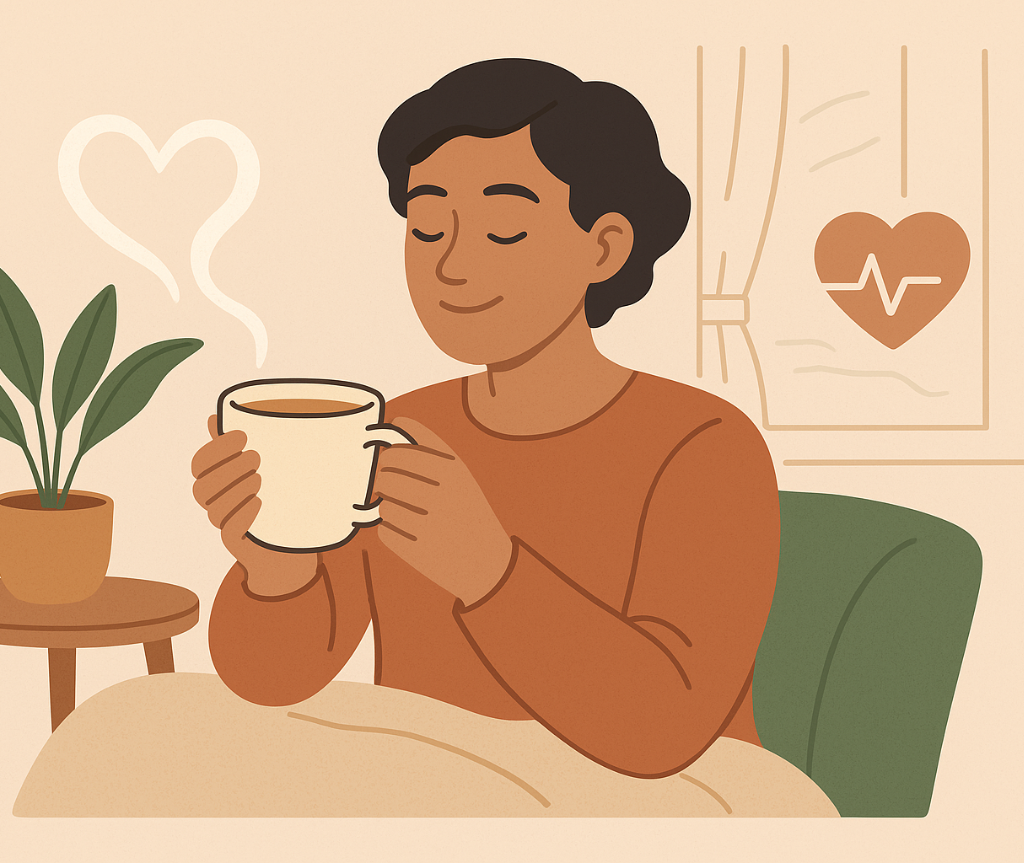When you sip a warm cup of tea, you’re not just indulging in a soothing ritual—you might also be quietly supporting your heart. The effects of tea on blood pressure are becoming clearer, with research indicating that regular tea consumption may help lower the risk of hypertension and heart disease.
How Tea Helps Manage Blood Pressure
High blood pressure (hypertension) means your heart has to work harder to pump blood, increasing your risk for serious conditions like heart attacks and strokes. But what does tea have to do with it?
Tea, particularly green and black varieties, is rich in natural plant compounds known as flavonoids. One of the most studied, epigallocatechin gallate (EGCG), helps relax your blood vessels by boosting nitric oxide levels. This makes it easier for blood to flow, gently lowering the pressure on artery walls. Tea may also reduce levels of endothelin-1, a substance that constricts blood vessels.
But don’t expect miracles overnight. The key to tea’s benefits is consistency—regular, daily consumption over several months.
Green Tea: The Most Studied Tea for Blood Pressure
Among all tea types, green tea has shown the most potent effects on blood pressure. In studies, people who drank green tea daily for 12 weeks lowered their systolic blood pressure (the top number) by about three mmHg and diastolic pressure (the bottom number) by about one mmHg.
Those numbers might seem small, but even modest reductions can significantly cut your risk of stroke and heart disease, according to the British Heart Foundation.
Green tea also supports weight and metabolic health, two major players in blood pressure control. For optimal results, aim for 5–6 cups daily, providing approximately 200 mg of EGCG, the amount often observed in studies.
Black Tea: An Easier Alternative That Still Works
Don’t enjoy green tea? No problem. Black tea is another fantastic choice that can still do wonders for your heart.
Studies show that sipping on three cups of black tea a day can help gently lower your blood pressure over time. In one long-term study, individuals who made this a daily habit observed noticeable improvements in both their systolic (top) and diastolic (bottom) blood pressure readings. Even though the changes were small, they were meaningful, especially when added up over months or years.
Black tea might not pack quite the same punch as green tea, but it’s often more convenient. It’s easy to find in stores, pairs well with a splash of milk or lemon, and is something many people already enjoy every day.
To get the most out of black tea, let it steep for 3 to 7 minutes and enjoy it throughout the day, whether in the morning, afternoon, or evening. This slow and steady approach can help your body benefit from its heart-friendly compounds.
It’s a Long-Term Commitment
Many people make the mistake of expecting quick results, but tea works differently from medications. You won’t notice a dramatic change after just one cup or even one week.
To maximise these benefits, opt for high-quality tea. Higher-quality teas often contain more polyphenols, the plant compounds responsible for many of tea’s health effects.
Consider tea as part of your long-term wellness plan. Start small, perhaps replacing one of your usual beverages with tea, and build the habit gradually.
What Tea Can (and Can’t) Do for You
Let’s keep it real: tea isn’t a miracle cure. If you already have high blood pressure, it won’t replace your prescribed medications. However, if your blood pressure is normal or slightly elevated, tea may help keep it in check.
Talk to your doctor before making significant changes, especially if you’re on medication. And avoid sugar when drinking tea—it can do more harm than good.
Key Takeaways
Adding tea to your daily routine isn’t just comforting—it’s a proactive step toward better heart health. Thanks to compounds like EGCG, both green and black teas can modestly lower blood pressure when consumed consistently.
- Green tea offers the most significant benefits, particularly at 5–6 cups per day.
- Black tea remains a solid option, with effective results at three cups daily.
- Benefits emerge after at least 12 weeks of regular consumption.
- Even a modest daily intake (half a cup) may significantly reduce the long-term risk of high blood pressure.
As part of a balanced lifestyle, tea serves as a simple, affordable, and evidence-backed way to care for your heart.



